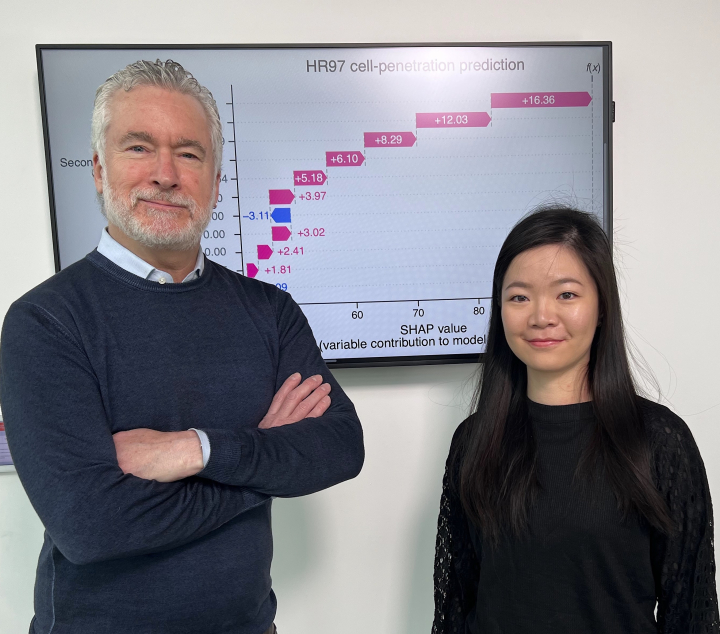UMD Researchers Partner with Wilmer Eye Institute to Enhance Sustained Delivery of Ocular Drugs
Computational biologists at the University of Maryland are partnering with ophthalmologists from the renowned Wilmer Eye Institute at John Hopkins University to improve therapeutic options for people suffering from chronic ocular diseases.
Michael Cummings (left in photo) a professor of biology with an appointment in the University of Maryland Institute for Advanced Computer Studies, and Renee Ti Chou (right), a fourth-year computational biology doctoral student, are using machine learning algorithms and other methods to enhance how certain drugs are administered to patients suffering from serious eye ailments.
Their research is covered in-depth in a paper published on May 2, 2023, in the prestigious journal Nature Communications.
According to the Centers for Disease Control and Prevention, more than 4.2 million Americans aged 40 years and older are either legally blind or have low vision, primarily due to age-related eye diseases such as macular degeneration, cataracts, diabetic retinopathy, and glaucoma.
Surgery is an option for some, but for many others, treatment involves strictly adhering to eyedrop dosing regimens or frequent intraocular injections. This has proven to be problematic, with studies showing that only 64% of patients being treated for glaucoma adhere to the three-times daily eyedrop dosing schedule over a four-week period.
Implantable drug delivery systems remain a promising option for the sustained, controlled delivery of therapeutics in the eye, but they come with their own set of risks, including adverse reactions to the cornea and other side effects.
The UMD researchers, working with ophthalmologists, bioengineers, and pharmacologists at The John Hopkins University School of Medicine—home to the Wilmer Eye Institute—have an alternative solution, one that involves a process known as peptide engineering.
Chou, who is the co-lead author of the paper, says the key to their work is to improve the drug binding properties in ocular melanin, which is found in pigmented eye tissues and protects the eye from harmful ultraviolent light. Ocular melanin can act as a sustained-release depot in the eye for drug therapeutics, Chou adds, allowing the drugs to remain active for longer periods, which translates to less eyedrops or intraocular injections.
But not all drugs bind well to melanin, so the researchers are hoping to use peptides, which are short sequences of amino acids, as an “adaptor” to impart the melanin binding property to non-melanin binding drugs.
“In our study, we linked the candidate peptide to an ocular drug through conjugation and demonstrated that it can increase the drug retention time from eight days to up to 18 days, using an intraocular pressure reducing drug called brimonidine as an example,” Chou says.
Cummings, who is director of the Center for Bioinformatics and Computational Biology, says they used machine learning-based analytical methodology to develop the peptide adaptor, which is able to engineer new types of peptides that have a high cell-penetrating ability coupled with low cytotoxicity properties.
“We believe this method will have a distinct advantage over current implantable devices, as it does not require surgery or device removal, and is expected to have fewer side effects, both of which can improve a patient’s quality of life,” says Chou.
—Story by Melissa Brachfeld, UMIACS communications group
The Department welcomes comments, suggestions and corrections. Send email to editor [-at-] cs [dot] umd [dot] edu.
